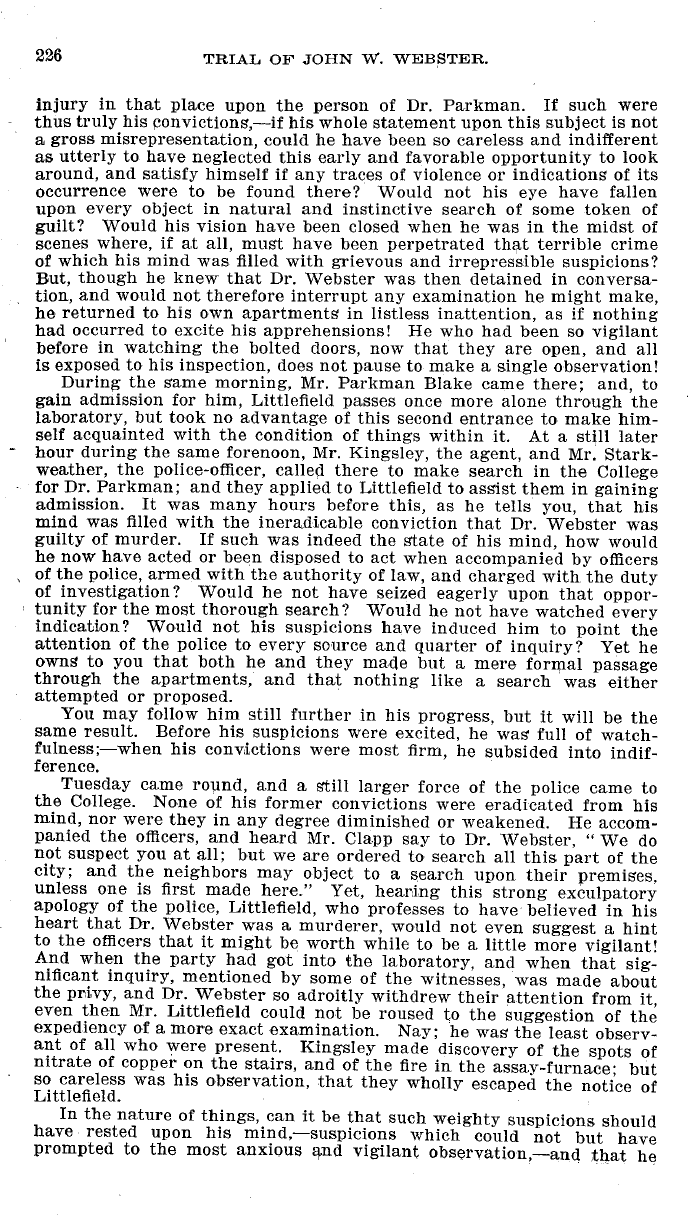|
226 TRIAL OF JOHN W. WEBSTER.
injury in that place upon the person of Dr. Parkman. If such were
thus truly his ponvictions,-if his whole statement upon this subject is not
a gross misrepresentation, could he have been so careless and indifferent
as utterly to have neglected this early and favorable opportunity to look
around, and satisfy himself if any traces of violence or indications of its
occurrence were to be found there? Would not his eye have fallen
upon every object in natural and instinctive search of some token of
guilt? Would his vision have been closed when he was in the midst of
scenes where, if at all, must have been perpetrated that terrible crime
of which his mind was filled with grievous and irrepressible suspicions?
But, though he knew that Dr. Webster was then detained in conversa-
tion, and would not therefore interrupt any examination he might make,
he returned to his own apartments in listless inattention, as if nothing
had occurred to excite his apprehensions! He who had been so vigilant
before in watching the bolted doors, now that they are open, and all
is exposed to his inspection, does not pause to make a single observation!
During the same morning, Mr. Parkman Blake came there; and, to
gain admission for him, Littlefield passes once more alone through the
laboratory, but took no advantage of this second entrance to make him-
self acquainted with the condition of things within it. At a still later
hour during the same forenoon, Mr. Kingsley, the agent, and Mr. Stark-
weather, the police-officer, called there to make search in the College
for Dr. Parkman; and they applied to Littlefield to assist them in gaining
admission. It was many hours before this, as he tells you, that his
mind was filled with the ineradicable conviction that Dr. Webster was
guilty of murder. If such was indeed the state of his mind, how would
he now have acted or been disposed to act when accompanied by officers
of the police, armed with the authority of law, and charged with the duty
of investigation? Would he not have seized eagerly upon that oppor-
tunity for the most thorough search? Would he not have watched every
indication? Would not his suspicions have induced him to point the
attention of the police to every source and quarter of inquiry? Yet he
owns to you that both he and they made but a mere formal passage
through the apartments, and that nothing like a search was either
attempted or proposed.
You may follow him still further in his progress, but it will be the
same result. Before his suspicions were excited, he was full of watch-
fulness;-when his convictions were most firm, he subsided into indif-
ference.
Tuesday carne round, and a still larger force of the police came to
the College. None of his former convictions were eradicated from his
mind, nor were they in any degree diminished or weakened. He accom-
panied the officers, and heard Mr. Clapp say to Dr. Webster, " We do
not suspect you at all; but we are ordered to search all this part of the
city; and the neighbors may object to a search upon their premises.
unless one is first made here." Yet, hearing this strong exculpatory
apology of the police, Littlefield, who professes to have believed in his
heart that Dr. Webster was a murderer, would not even suggest a hint
to the officers that it might be worth while to be a little more vigilant!
And when the party had got into the laboratory, and when that sig-
nificant inquiry, mentioned by some of the witnesses, was made about
the privy, and Dr. Webster so adroitly withdrew their attention from it,
even then Mr. Littlefield could not be roused to the suggestion of the
expediency of a more exact examination. Nay; he was the least observ-
ant of all who were present. Kingsley made discovery of the spots of
nitrate of copper on the stairs, and of the fire in the assay-furnace; but
so careless was his observation, that they wholly escaped the notice of
Littlefield.
In the nature of things, can it be that such weighty suspicions should
have rested upon his mind,-suspicions which could not but have
prompted to the most anxious and vigilant observation,-and that he
|

